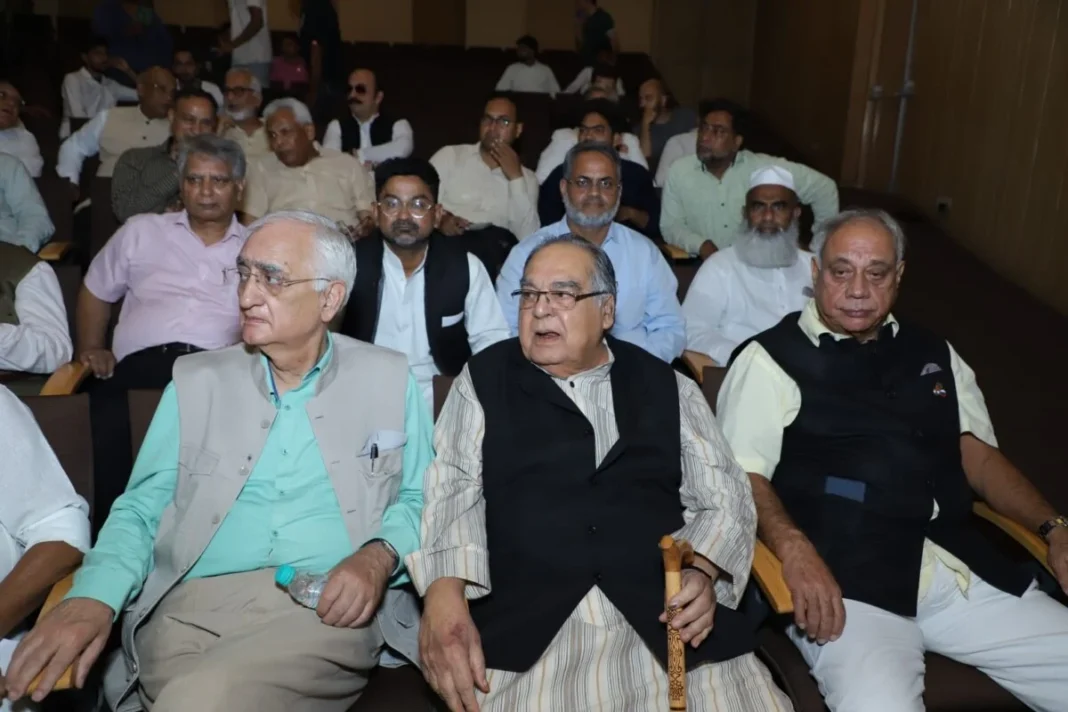IMCR Hold National Conference to Address Challenges and Chart Path Forward
Anwarulhaq Baig
NEW DELHI: Jawahar Bhawan, near the Parliament has witnessed a gathering of newly elected MPs, politicians, former union ministers, and prominent figures from various political affiliations united in opposition to communalism, hate politics, and discrimination against minorities in India, convened by the Indian Muslims for Civil Rights (IMCR).
The gathering attracted a wide range of participants, including newly elected MPs such as Iqra Hasan, Zia ur Rahman Barq, Agha Rohullah Mahdi, and Mohibullah Nadvi, religious scholars like Maulana Sajjad Nomani and Jamaat-e-Islami Hind president Syed Sadatullah Husani, former Union Minister Salman Khurshid, RJD MP Prof. Manoj Jha, AAP MP Sanjay Singh, former MP Kunwar Danish Ali, activists Shabnam Hashmi, Advocate Faizan Mustafa and senior farmer leader Sardar Daya Singh from Punjab. Sharing their thoughts on the current political scenario and ways to move forward, these diverse voices raised a united voice against the rising tide of communalism, hate politics, bulldozer politics, lynching incidents, violence, and plight of minorities, especially the Muslim community.
Welcome Address
In his welcome speech, Dr. Mohammed Adeep, IMCR chairman and former MP lamented the targeting of the Muslim community and what he described as deliberate attempts to diminish their significance and political representation. Adeep noted, “Even secular and opposition parties have become hesitant to share stages with Muslim leaders or nominate them as candidates and make them star poll campaigners.” The former Rajya Sabha MP advised Muslim parliamentarians to be leaders, not just followers, within their parties. He urged them to assert themselves as leaders rather than mere “feeders” of their parties.
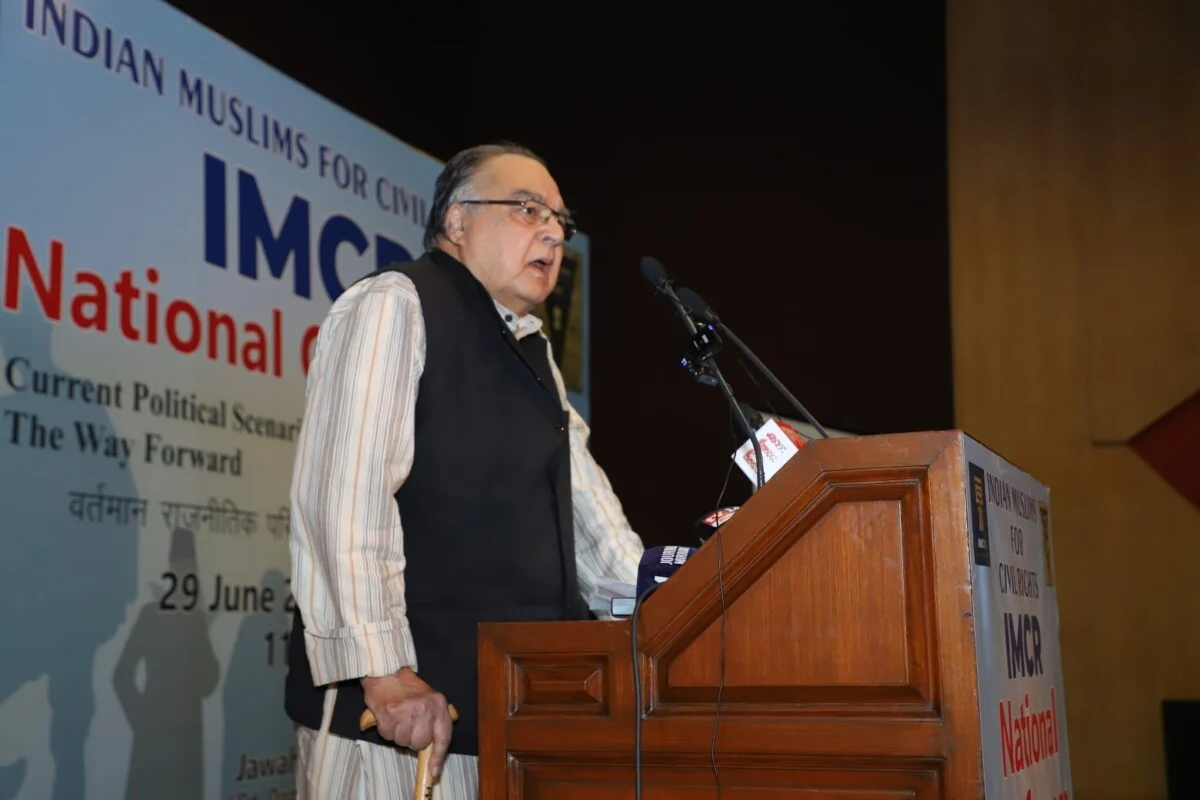
“We are not just voters, but partners in parties and government,” Adeeb declared. He expressed a desire to return to the “Hindustan” of his childhood and of ‘our dreams’, stating, “We would bring back the same ‘Hindustan’ which was during our childhood, or we had dreamed, and for that, we are looking for ‘Gandhi’ once again.”
Salman Khurshid’s Keynote Address
Delivering his the keynote address, former Union Minister and senior Congress leader Salman Khurshid expressed cautious optimism about the recent election results following the formation of the grand alliance ‘INDIA’, comprising several opposition parties. Noting some success in strengthening the opposition’s presence in parliament, Khurshid said, “We are not just happy for getting some achievements in the elections but we are contented that now our voices would be heard now. He emphasized that more work remains to be done.
Touching on the pending Supreme Court judgment on the minority status of Aligarh Muslim University (AMU), Khurshid stressed its significance and framed it as a critical test of India’s treatment of its Muslim citizens. He said, “If we could not save AMU, what would be left for us?”, recalling words from his grandfather, former Indian President Dr. Zakir Hussain, who once said that India’s treatment of AMU would reveal its attitude towards Indian Muslims.
Khurshid expressed concern over the targeting of the entire Muslim community and their educational institutions, particularly madrassas. He noted several high court remarks and judgments against the madrassa system and religious education. The former minister also discussed the challenges facing Muslim MPs working for community interests across party lines, including fear of polarization and accusations of “Muslim appeasement.” He advised MPs not to fall prey to polarization and urged the community to work for the welfare of all citizens without discrimination.
Jamaat-e-Islami Hind President’s Perspective on poll results
Jamaat-e-Islami Hind (JIH) president Syed Sadatullah Husaini offered an optimistic view of the 2024 General Election results. He interpreted the outcomes as a sign that the future of Muslims in India is not dark but bright. The JIH leader encouraged Muslims not to lose hope, noting that the people of India had rejected the politics of hate and division promoted by Prime Minister Modi himself.
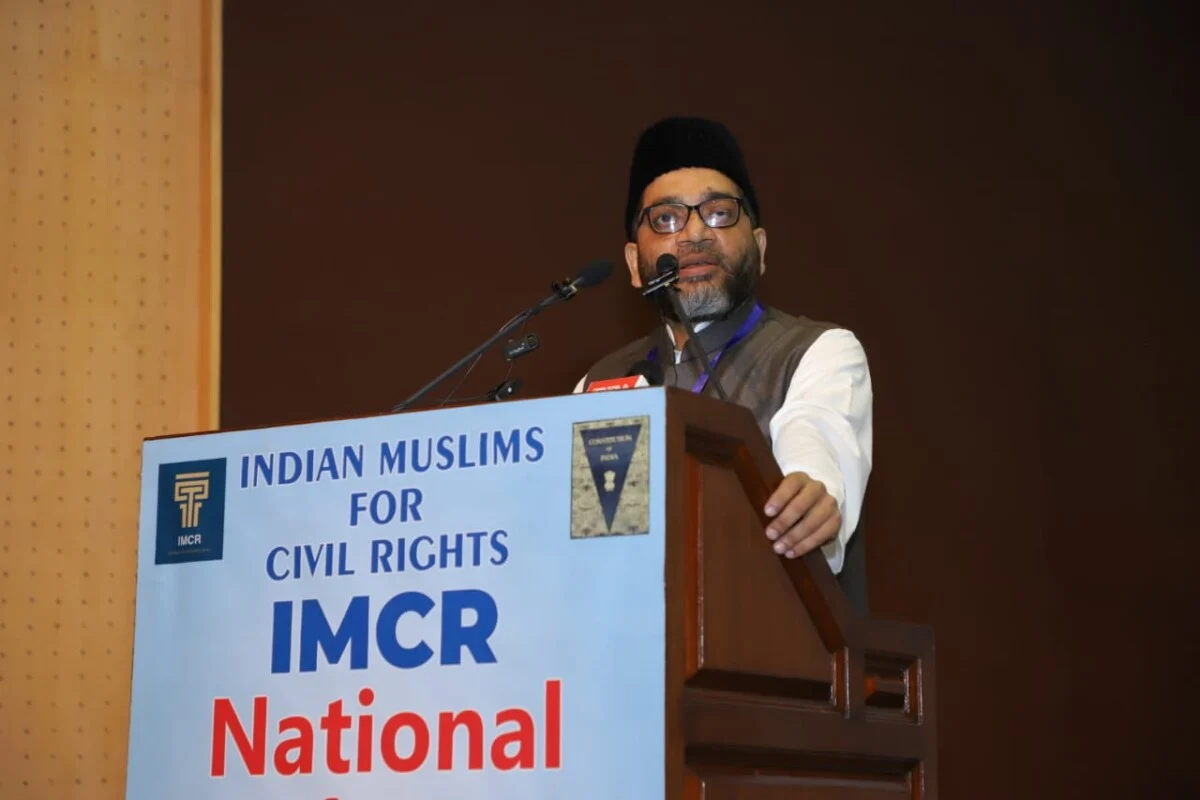
“People rejected BJP candidates in all Parliamentary constituencies where Modi delivered hate speeches,” he said. “This indicates that the people of the country will not accept the poison of hate doled out by anyone, even the PM of the country.”
The JIH president advised Muslims to prepare for a long struggle and to reach out at the mass level for unity against communalism. He also cautioned opposition parties that had been reluctant to address core values of unity and diversity or speak out against divisive politics, noting that such hesitation had led to setbacks in the elections.
Maulana Sajjad Nomani’s Call for Unity
Renowned Islamic scholar and interfaith leader Maulana Sajjad Nomani asserted that the majority of Indian voters based their decisions on real issues affecting the country, such as farmers’ problems, unemployment, rising prices, and atrocities against women. He interpreted the election results as a sign that people want to resolve their basic issues rather than engage in communal polarization or hate politics.
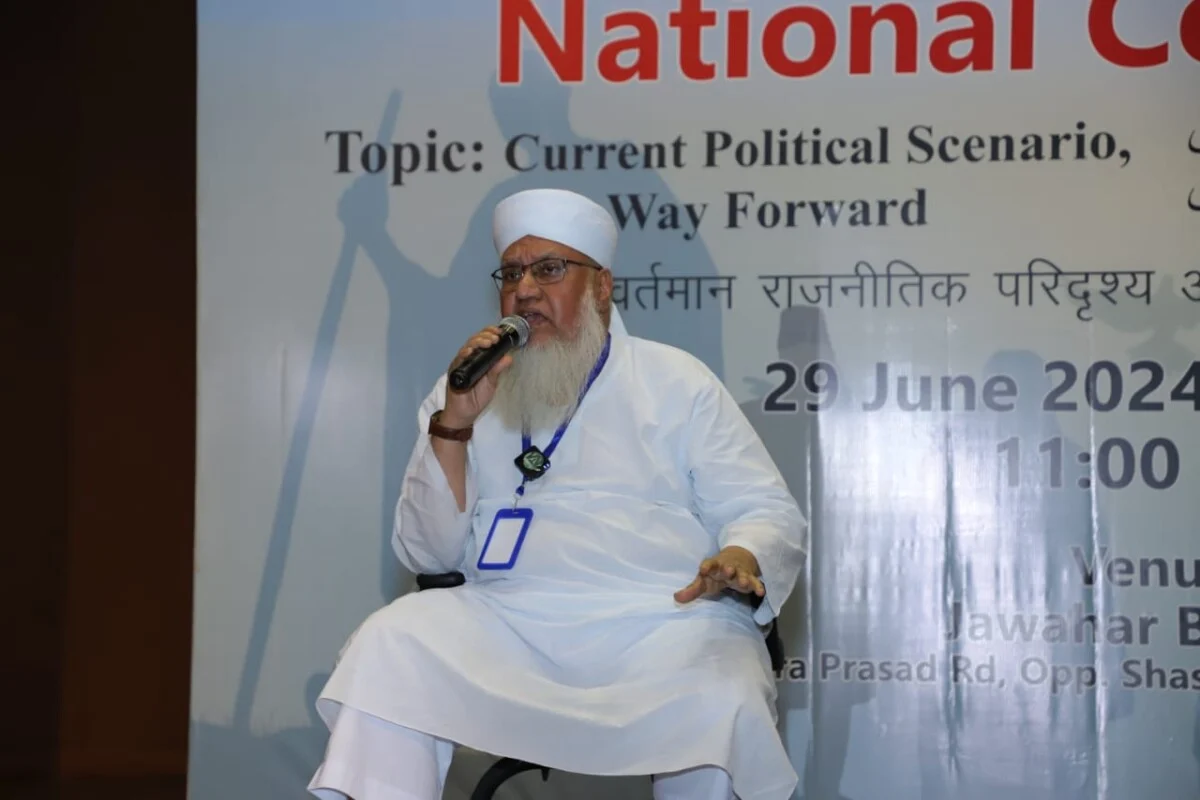
Maulana Nomani highlighted his active participation in and support for the farmers’ agitation, noting that Sikh and farmer leaders had subsequently invited him to Punjab and warmly welcome him. He called on the Muslim community to fight for all communities, not just themselves, and suggested forming local-level forums and committees to build relationships among different communities and fight against communalism.
Perspectives from Jammu and Kashmir
Aga Syed Ruhullah Mehdi, a newly elected MP from Jammu and Kashmir on the National Conference ticket, addressed the targeting of Muslims and minorities in the country. He criticized the changing vocabulary related to Muslims and minorities, noting that before 2014, there were “minorities,” but in the past decade, they have become “oppressed sections” of the country.
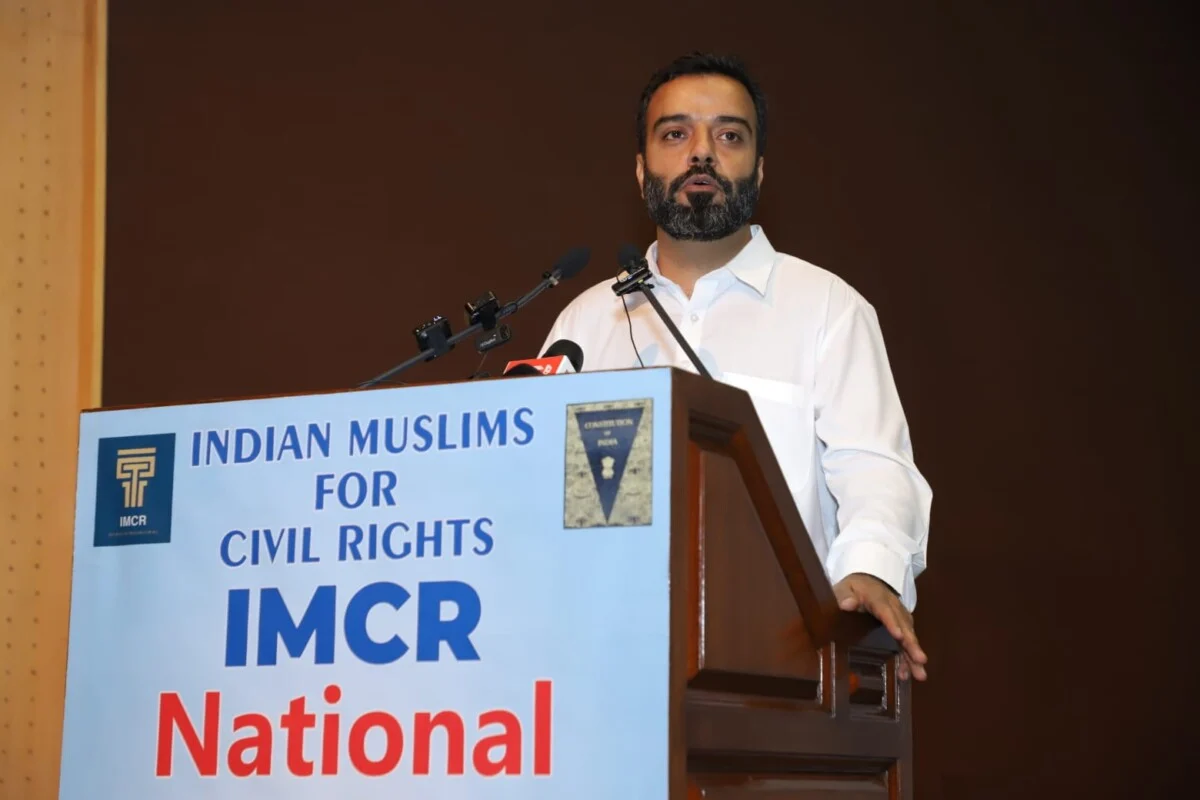
Quoting verses from the Quran, Mehdi encouraged the Muslim community to make efforts for their upliftment and to raise their voices against all atrocities. He emphasized the Islamic duty to stand up for the weak and marginalized, regardless of their faith or background.
Mehdi described the striking down of Article 370 and the removal of Jammu and Kashmir’s state status in 2019 as a “collective lynching of the whole Kashmiri people.” He lamented that when Kashmir was made an “open prison” and homes were being demolished, the rest of the country should have stood against these atrocities.
AAP MP’s Stance on Hate Politics
Firebrand AAP MP Sanjay Singh called on people to fight against the politics of hatred and division to make the country safer. He vowed to continue this fight until hate politics is rooted out, pointing directly at the BJP as the party responsible for promoting such divisive tactics.
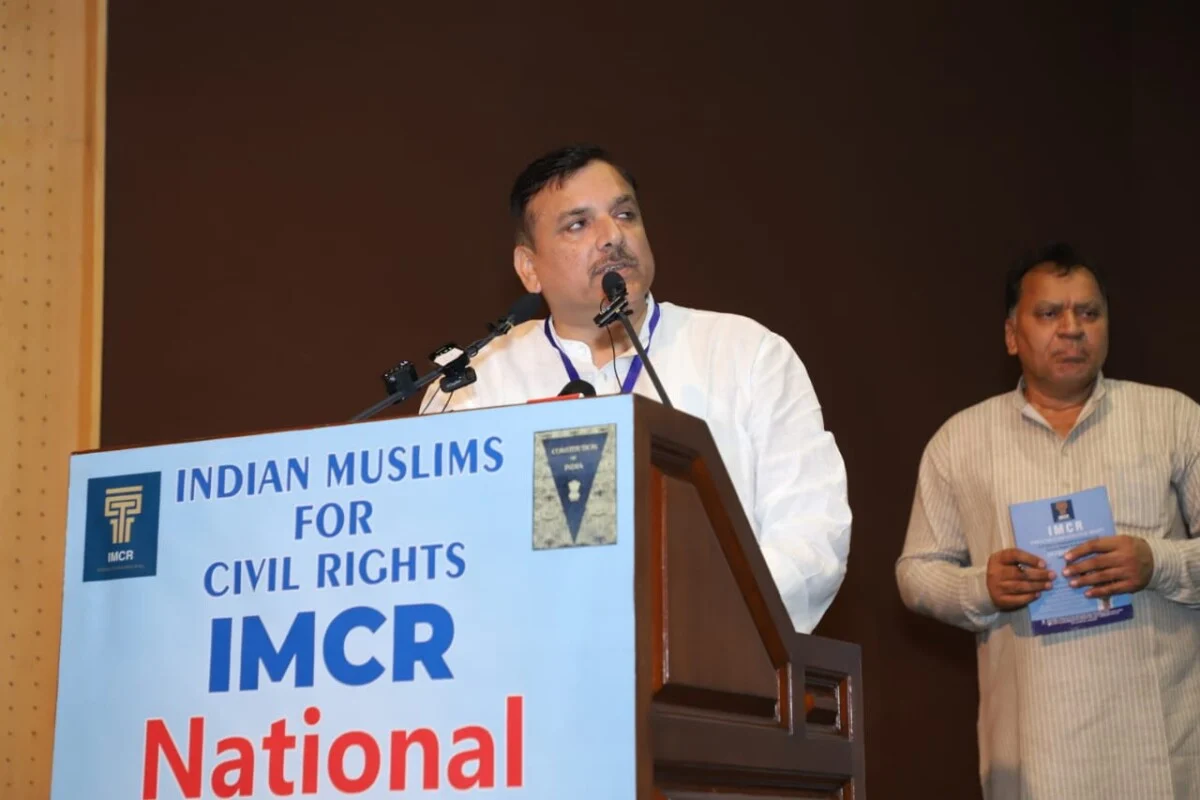
Singh noted that bulldozers, which initially targeted Muslim homes, are now demolishing Hindu homes as well. He cited the example of Ayodhya in Uttar Pradesh, where the NDA suffered crushing defeats in the recent Lok Sabha elections. “Everyone, whether Hindu or Muslim or Christian, should speak out against atrocities which are being done to anyone,” Singh asserted.
The AAP MP revealed that he had been imprisoned for six months through the Enforcement Directorate by the BJP-led government for speaking out against the government’s actions. Despite this, he vowed to continue fighting for justice, truth, unity, and secularism.
RJD Leader on Changing Political Discourse
Prof. Manoj Jha, RJD leader and Rajya Sabha MP from Bihar, spoke about the changing mindsets of secular parties regarding Muslims. He noted that even his own party has begun using the word “minority” instead of “Muslim” when discussing the community over the past decade.
Jha criticized opposition leaders and different political parties for their silence on critical issues, terming it the “grammar of silence.” He expressed hope that the recent election mandate showed that the people of India still have the urge to recreate the country based on the principles of Ganga-Jamuna culture.
Sikh Leader Recalls Farmer Movement and Community Unity
Sardar Daya Singh, a prominent farmer leader from Punjab, recalled the 13-month-long Kisan movement at the Delhi border, where thousands of farmers protested against three controversial farm laws. He noted that nearly 800 farmers lost their lives during the movement.
Singh highlighted the unity between Sikh and Muslim communities during the agitation, mentioning that Muslims supported the farmers’ cause, and Sikhs opened their gurdwaras for Muslims to offer namaz. He attributed the movement’s success, which culminated in Prime Minister Modi’s announcement to repeal the laws, to this unity between Sikhs and Muslims.
The Sikh leader also recalled the Muslim community’s contributions in protecting Sikhs during the 1984 anti-Sikh riots, where Muslims provided shelter to Sikhs at great personal risk.
Voices of Newly Elected MPs
Ziaur Rahman Burq, newly elected SP MP from Sambhal and grandson of the late firebrand leader Shafiqur Rahman Burq, vowed to raise his voice against all atrocities and tyrants. He mentioned a recent visit with Samajwadi Party chief Akhilesh Yadav to the family of a poor Muslim baker who was lynched in Aligarh, assuring them of support.
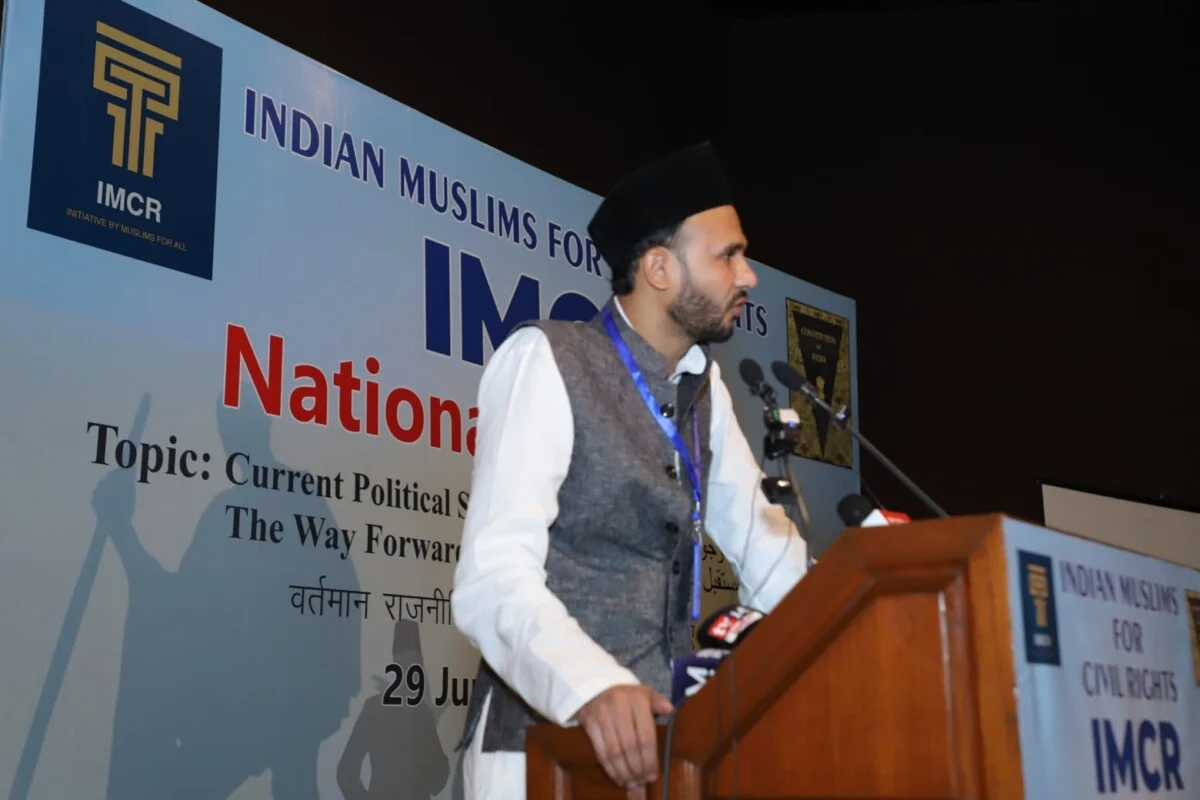
Iqra Hasan Chaudhari, newly elected MP from Kairana in UP, promised to work on issues affecting all communities without discrimination. She emphasized the need for social change alongside political change.
Perspectives from Other Political Leaders
Kunwar Danish Ali, former MP from Amroha, UP, cautioned that despite the BJP’s failure to secure a majority on its own, they might become more aggressive, like an “injured animal.” He called for continued united efforts against the politics of hate and division.
C.T. Mohammed Basheer, All-India Muslim League MP from Kerala, suggested replicating the cordial relations between different communities in Kerala across other parts of the country to combat communalism. He emphasized that India’s bright future lies in forming close alliances among Dalits, minorities, OBCs, and other backward communities.
Dr. Fauzia Khan, NCP MP from Maharashtra, highlighted the continued importance of Muslim voters in elections. She suggested forming social alliances among different communities, similar to the political alliance of the opposition INDIA, to address common issues.
Congress leader and Rajya Sabha MP Imran Pratapgarhi called for regular meetings among MPs from minority groups to discuss common issues and make unified efforts. He also shared his successful efforts in raising the voice in the Rajya Sbha about the potential demolition of the Sunehri Bagh Masjid near the parliament building.
Mohammed Salim, senior CPM leader and former MP from West Bengal, reminded Muslims of their responsibility to protect the civil rights of all people and communities in the country, not just their own. He emphasized the need for strategic coalitions and alliances among backward and minority communities, Dalits, tribals, OBCs, and other vulnerable groups.
Activist’s Concerns and Call to Action
Senior activist Shabnam Hashmi from Gujarat raised concerns about EVM manipulation during elections, an issue she has been highlighting since 2012. Despite some weakening of the ruling coalition in recent elections, Hashmi noted that communal incidents continue unabated, with ongoing reports of lynchings, house demolitions, and legal actions against journalists and activists.
Hashmi urged anti-communal groups and coalitions not to cease their efforts, especially with upcoming assembly elections in four key states.
The gathering, organized by Indian Muslims for Civil Rights (IMCR), brought together a diverse group of leaders and activists to address pressing issues of communalism and minority rights in India. Founded in June 2022, IMCR is a non-political, non-religious organization working to secure the civil and constitutional rights of Muslims and other oppressed minority groups in the country.

